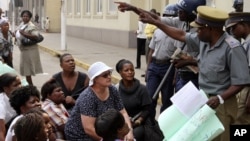Zimbabwe’s Gender Commission brings new hope to local women whose potential has been limited by social, political, religious and cultural barriers.
The Commission was established to deal with gender discrimination.
In an exclusive interview with Studio 7, veteran civil servant and former permanent secretary in the Ministry of Tourism and Hospitality, Mrs. Margaret Mukahanana Sangarwe, said the commission will strive to reach even the remotest areas of Zimbabwe as women in those places need to be empowered to the level of their counterparts in urban areas.
Sangarwo said the Commission will have an economic and social impact on the general lives of the women of Zimbabwe.
“Among other things, the work of the Commission if to strive for gender balances in the work place, and to find means of marrying culture, religion and gender equality, in a bid to empower the women of Zimbabwe,” emphasized Sangarwe.
“The Commission is an umbrella body that does not discriminate men against women … Women are a priority now as they have been marginalized for a long time, but the Commission is about inclusiveness, and this is seen in the composition of its members, which is a balance of both men and women,” she said.
Mrs. Sangorwa noted that the Zimbabwe Gender Commission is charged with tasks of investigating possible gender violations, get complaints and recommendations from the general public, and take action when need arises.
The roles of the commission also include but are not limited to carrying research on issues relating to gender and social justice which will help it to come up with recommendations on changing laws and practices which lead to gender-based discrimination and recommending prosecution for criminal violation of rights related to gender.
Nine gender commissioners were sworn in by President Robert Mugabe on the September 2, 2015, under Section 245 of the Constitution, which stipulates that “the President appoints the chairperson after consultation with the Parliamentary Committee on Standing Rules and Orders, and chooses seven of the remaining members from a list of candidates submitted by that Committee after a public selection process. The final member is nominated by the National Council of Chiefs.”





